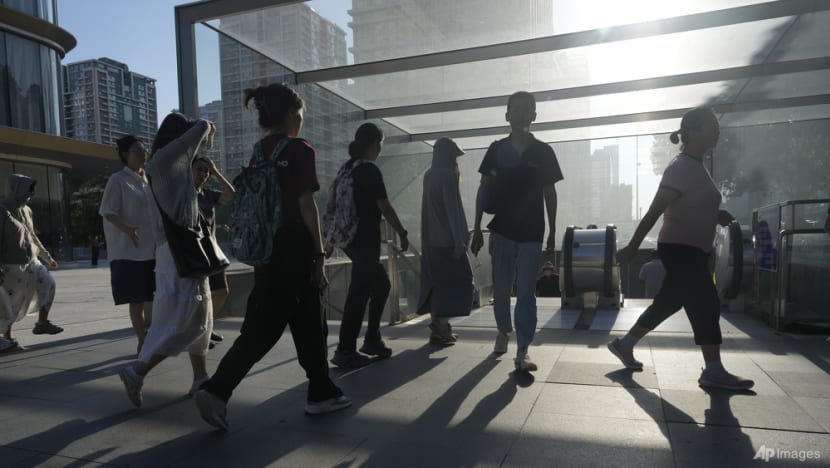This Chinese city is among the latest to try a 4.5-day work week. Will it pay off?
The aim is to boost worker morale and encourage travel and spending to revitalise the local economy, said officials from Mianyang city in Sichuan, which joins a list of Chinese cities attempting similar moves.

People walk towards the entrance to a subway line as workers leave after office hours in Beijing. (AP Photo/Ng Han Guan)

This audio is generated by an AI tool.
SINGAPORE: The idea is simple: a shortened four-and-a-half day work week, coupled with an extended two-and-a-half day weekend, to boost the morale of workers and encourage spending.
That’s how Chinese officials from the city of Mianyang in Sichuan are hoping to revive languishing consumption rates - by piloting a flexible new “Friday afternoon plus weekend” leave model as part of its 2025 work plan to revitalise the local economy.
A preliminary proposal was announced earlier in May, but news only spread fast on Chinese social media sites last week after several media outlets reported about it.
Many netizens voiced their approval and called for more widespread adoption and support of such trials in their provinces and cities.
Boosting consumption remains a top economic priority in the year ahead for China as the world’s second largest economy shakes off deflationary pressures while bracing for global trade tensions with the United States.
Chinese firms and corporations have also been working towards tackling the country’s brutal “996 work system” - the expectation of working from 9am to 9pm, six days a week - implementing new incentives and measures that would allow employees to clock off work on time and reset.
Shorter work weeks and prolonged weekend proposals have also gained traction in other Chinese cities like Chongqing and provinces including Hebei, Hubei, Guangdong, Fujian and Jiangxi.
In the city of Longnan in Gansu province, administrative and public institutions as well as companies and smaller firms have been encouraged to give workers and employees Friday afternoons off as long as they have performed all essential services and completed required work hours.
In Mianyang, an additional half day off on Fridays would allow office workers more leisure time and other opportunities, according to the Mianyang Municipal Commerce Bureau in a notice released in May.
Speaking to the Global Times tabloid, a Mianyang resident named Yang said that an extra half day off work would mean more leisure time that could allow for domestic travel and sightseeing.
“Time is really short,” said another worker, who expressed his desire for the initiative to be implemented further which would allow for more time spent with his wife and child.
In its plan, Mianyang officials outlined seven core actions which included measures to revive local economic sectors like events, travel and the night economy.
Plans for a shorter work week were still in preliminary stages, officials said, adding that special rules to facilitate longer weekends had yet to be introduced, along with other concerns and challenges.
“We need to combine specific circumstances and conduct discussions and research with other departments,” an official told the Global Times, adding that the policy proposal was merely an encouragement, not a stipulation, to compel corporations and offices to apply the policy to their workers.

Long hours and working overtime remain prevalent in many Chinese companies and industries, but mindsets are changing notably among Chinese Gen Z-ers and young workers, who have been fighting burnout and pushing back against working long hours.
On Chinese social media platforms like the popular Sina Weibo microblogging site, netizens weighed in on Mianyang’s work week experiment and discussed work life balance in the city.
A topic thread with the hashtag “2.5-day weekend is coming” has gained huge traction on the site, garnering more than 24 million total views and generating some 6,000 discussions.
But some reactions have also been mixed, with netizens expressing scepticism at the policy proposals and suggesting that the authorities should implement weekends properly first before moving to two-and-a-half days.
“You can't even do a two-day weekend properly, settle that first before (looking at) two-and-a-half days,” said one Weibo user in a comment that drew thousands of likes. “I only have one day off so I don’t understand what is going on here,” said another.
Some criticised the “vague terms and conditions” outlined in the policy document, leading to confusion on how rules would be implemented or who it may ultimately apply to.
One Weibo user expressed concern over the policy changes and how they might not apply to all workers, especially those in factories already working extremely long shifts - sometimes for up to 12 hours, six days a week.
This would be in sharp contrast to civil servants for example, who already work shorter weeks. “Haven’t civil servants already had 4.5 day work weeks?” the user wrote.
CHALLENGES
Although proposed policy action in Mianyang and other cities could bring workers much needed respite from stress, implementing an official 4.5 day work week on a larger scale is still tricky, said observers.
Professor Yang Haiyang, dean of the Research Institute of Social Development at Southwestern University of Finance and Economics in Chengdu, noted that “reducing working hours” was part of the inevitable trend of social and economic development and progress.
But it was not a one-size-fits-all approach, he told the People’s Daily state newspaper, adding that promotion and implementation were still needed to work alongside existing arrangements and conditions in order for it to work.
Other observers have also advised caution, citing reduced work hours could lead to higher corporate costs and lower productivity rates, which would place further pressure on employers.
In the case of Mianyang, the onus ultimately remains with employers, officials said. Employees would still be expected to work eight hours a day, and previous baselines would still apply.
Those unable to complete their benchmark of 40 hour work weeks by Friday would still have to make up for it on other weekdays through overtime work, officials said.
















